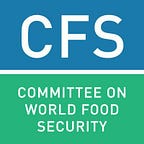A lot on their plate
Empowering women and girls to end hunger and malnutrition
Women’s role in food security and nutrition is crucial. In many societies women supply most of the labour for growing food crops. Food grains, which are grown predominantly for commercial use, depend on women’s labour but their sale is controlled by men. Such crops are produced with a commercial orientation and are often sold almost immediately after harvest. Women tend to store the crops they grow for home use or processing adding value by grinding, drying, or preserving.
Transportation issues constrain women’s earning opportunities. Cash crops, such as cocoa, coffee and tea are often collected at the farm gate, whereas food crops need to be transported by the grower to local markets. In Africa this is commonly done by women carrying loads on their heads. Studies have found that women transport 26 metric ton kilometers per year compared to less than 7 for men (CFS 37 Policy Roundtable on Gender, Food Security and Nutrition).
Multiple roles, multiple responsibilities
While men have their key focus on the market economy, women are constantly juggling roles sustaining the household and reproductive economy, providing community services, and engaging, where possible, with the market economy. The market economy depends on the household economy but most national accounts completely fail to recognise the household economy and, as such, public policy often neglects it and the key role played by women (CFS 37 Policy Roundtable on Gender, Food Security and Nutrition).
Tenure and Investment
A key pre-condition for stable food production is secure access to land and other resources. This was highlighted in the Voluntary guidelines on the responsible governance of tenure of land, fisheries and forests in the context of national food security which were endorsed by the Committee on World Food Security (CFS) in 2012 and ask governments to “ensure that women and girls have equal tenure rights and access to land, fisheries and forests independent of their civil and marital status”. Likewise one of the CFS Principles for Responsible Investment in Agriculture and Food Systems is on gender equality and includes “Eliminating all measures and practices that discriminate or violate rights on the basis of gender.”
Ensuring food security and nutrition at the household and global level requires investing in nutrition sensitive agriculture, protecting women’s rights and improving their social and nutritional status.
Long-term investments in the role of women as full and equal citizens — through better nutrition, education, economic, social, and political empowerment — will be the only way to deliver sustainable improvements in food security and nutrition.
We now have the global commitment to achieve the Sustainable Development Goals by 2030. We also have the follow up to the Second International Conference on Nutrition (ICN2) and the Decade of Action on Nutrition which runs until 2026. To achieve these commitments we need the full and equal participation of women.
Policy solutions
While much policy is gender blind, it is not gender neutral in its impact due to the differing roles, resources, mobility and constraints facing men and women.
In its 2011 policy recommendations, the Committee on World Food Security (CFS) noted that in order to strengthen gender sensitive food security and nutrition policies, statistics should be sex disaggregated. Without gender analysis, policy can inadvertently have a negative impact on food security and nutrition by further compromising women’s roles in the different spheres.
International Women’s Day this March 8 has the theme “Women in the Changing World of Work: Planet 50–50 by 2030”. Likewise the 61st Session of the Commission on the Status of Women, also in March, is looking at “Women’s economic empowerment in the changing world of work”. While empowering women to participate more equally in the workplace is important, it shouldn’t be forgotten that women are still the primary providers of food.
CFS will be holding a Forum on Women’s Empowerment in the Context of Food Security and Nutrition in September 2017 to help ensure that women take their rightful place at the table.
The Committee on World Food Security (CFS) is leading multi-stakeholder platform for food security and nutrition policy guidance.
